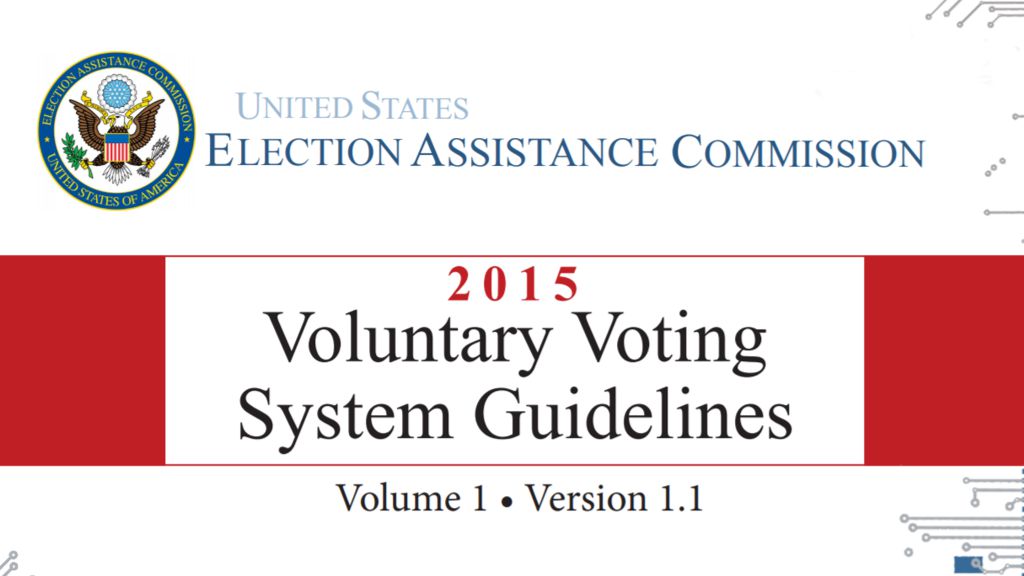Who Sets Voting System Standards?
The U.S. Election Assistance Commission (EAC) was established by the federal Help America Vote Act (HAVA) of 2002 and charged with developing Voluntary Voting System Guidelines (VVSG). These guidelines, which are voluntary for states, outline specifications against which voting systems can be tested. They address all the requirements listed below—security, functionality, privacy, usability and accessibility. The EAC relies on the National Institute of Standards and Technology (NIST) to write the detailed technical guidelines, and on the Technical Guidelines Development Committee (TGDC), a group of volunteer stakeholders—vendors, academics, advocates, election officials, etc.—to review the guidelines. The TGDC makes recommendations to the EAC, which then formally adopts them.
The VVSG 1.1 were adopted on March 31, 2015. These are the most current federal guidelines to be formally adopted.
States that use federal standards to evaluate their voting systems typically do so using this set of standards. Before the EAC was created, the National Association of State Election Directors (NASED) certified voting systems according to standards developed by the Federal Election Commission (FEC). Some state statutes still refer to NASED and FEC standards and certification, although it has been more than a dozen years since they were active.
Voluntary Voting System Guidelines (VVSG) are a set of specifications and requirements against which voting systems can be tested to determine if the systems meet required standards. Some factors examined under these tests include basic functionality, accessibility, and security capabilities. HAVA mandates that EAC develop and maintain these requirements.
On December 13, 2005, the EAC unanimously adopted the 2005 VVSG, which significantly increased security requirements for voting systems and expanded access, including opportunities for individuals with disabilities to vote privately and independently. The guidelines updated and augmented the 2002 Voting System Standards, as required by HAVA, to address advancements in election practices and computer technologies.
After adopting the 2005 VVSG, EAC tasked the Technical Guidelines Development Committee (TGDC) with developing the next iteration of the VVSG. On March 31, 2015, the commissioners unanimously approved the VVSG 1.1, which clarified the guidelines to make them more testable; enabled the National Institute of Standards and Technology (NIST) to create test suites for the proposed revisions; and improved portions of the guidelines without requiring massive programmatic changes.
Almost immediately following the adoption of VVSG 1.1, a public working group process was developed to help inform NIST and EAC on the development of the next iteration of voluntary voting system guidelines, entitled VVSG 2.0. On September 11-12, 2017, the TGDC voted on a recommendation of the VVSG 2.0 Principles and Guidelines. On February 7, 2020, the TGDC voted on a recommendation of the VVSG 2.0 Requirements to the EAC’s Acting Executive Director. NIST delivered the recommended requirements to the EAC’s Acting Executive Director on March 9, 2020. Currently, the VVSG 2.0 draft requirements are being circulated for comment from the public and the EAC’s Standards Board and Board of Advisors.
2.1.2 Accuracy
Memory hardware, such as semiconductor devices and magnetic storage media, must be accurate. The design of equipment in all voting systems shall provide for the highest possible levels of protection against mechanical, thermal, and electromagnetic stresses that impact system accuracy. Section 4 provides additional information on susceptibility requirements.
To ensure vote accuracy, all systems shall:
a. Record the election contests, candidates, and issues exactly as defined by election officials
b. Record the appropriate options for casting and recording votes
c. Record each vote precisely as indicated by the voter and produce an accurate report of all votes cast;
d. Include control logic and data processing methods incorporating parity and check-sums (or equivalent error detection and correction methods) to demonstrate that the system has been designed for accuracy
e. Provide software that monitors the overall quality of data read-write and transfer quality status, checking the number and types of errors that occur in any of the relevant operations on data and how they were corrected
In addition, DRE systems shall:
f. As an additional means of ensuring accuracy in DRE systems, voting devices shall record and retain redundant copies of the original ballot image. A ballot image is an electronic record of all votes cast by the voter, including undervotes.
2.1.4 Integrity
Integrity measures ensure the physical stability and function of the vote recording and counting processes.
To ensure system integrity, all systems shall:
a. Protect against a single point of failure that would prevent further voting at the polling place
b. Protect against the interruption of electrical power
c. Protect against generated or induced electromagnetic radiation
d. Protect against ambient temperature and humidity fluctuations
e. Protect against the failure of any data input or storage device
f. Protect against any attempt at improper data entry or retrieval
g. Include built-in measurement, self-test, and diagnostic software and hardware for detecting and reporting the system’s status and degree of operability
In addition to the common requirements, DRE systems shall:
h. Maintain a record of each ballot cast using a process and storage location that differs from the main vote detection, interpretation, processing, and reporting path
i. Provide a capability to retrieve ballot images in a form readable by humans








